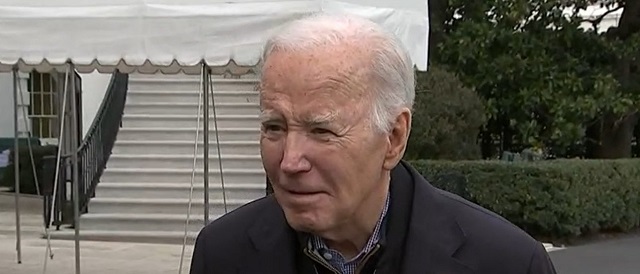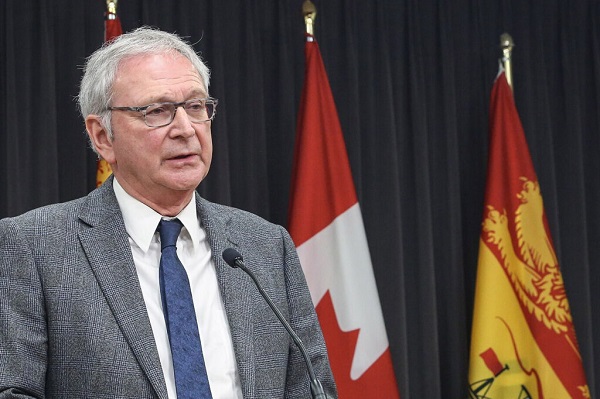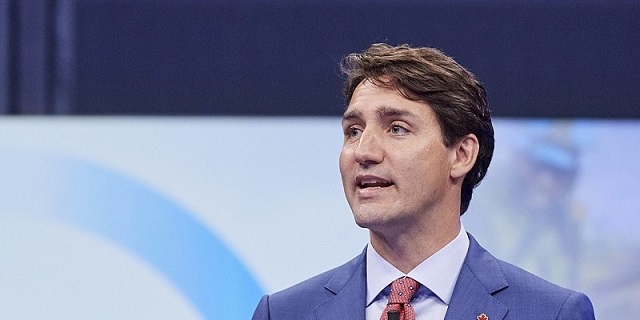COVID-19
Ontario policeman fights conviction, penalty for donating to the Freedom Convoy

From LifeSiteNews
By Justice Centre for Constitutional Freedoms
Constable Michael Brisco, a Windsor police officer, has appealed a conviction and penalty for donating $50 to the Ottawa Freedom Convoy in 2022 on freedom of expression grounds
The Ontario Civilian Police Commission heard the appeal of Constable Michael Brisco on Tuesday, who is challenging his conviction and penalty for donating to the Ottawa Freedom Convoy in early 2022. This case raises questions about the Charter’s protection for freedom of expression, the right of police officers to support political causes while off duty, and the privacy rights of all Canadians.
Constable Michael Brisco of the Windsor Police Service is a highly trained and respected police officer with no prior disciplinary record. He made a $50 donation to the peaceful Freedom Convoy protest through the GiveSendGo fundraising platform on February 8, 2022 – one day after an Ontario Superior Court Judge held that people could continue to engage in “peaceful, lawful and safe protest” in Ottawa so long as honking ceased. When making his donation, Brisco did not identify himself as a police officer and did not contribute to the protest in his capacity as a police officer.
Days later, the GiveSendGo donor list was hacked. The Ontario Provincial Police Service acquired the list and forwarded a set of names to the Windsor Police Service, who discovered that Brisco had donated to the protest.
The Windsor Police Service then chose to charge Brisco for “discreditable conduct.”
After a six-day hearing before an Ontario Provincial Police Adjudicator, Brisco was found guilty of discreditable conduct by a Tribunal on March 24, 2023. Two months later, on May 18, 2023, the Tribunal ordered that Brisco should forfeit pay for 80 hours of work as a penalty.
With the support of the Justice Centre, on June 14, 2023, Brisco filed a Notice of Appeal with Ontario Civilian Police Commission, challenging his conviction and the imposed penalty.
Counsel for Brisco argued that the prosecution against him lacks sufficient evidence. The claim that the Freedom Convoy in Ottawa was an unlawful protest rested entirely on claims made in newspaper articles by various officials, including the prime minister and the premier of Ontario. No credible video, photographic, or other evidence on this point was filed against Brisco. Further, counsel for Brisco argued that the evidence against him – a hacked list that ought to have remained private and confidential – was obtained illegally. Counting the donor list as evidence against Brisco amounts to an abuse of process, counsel argue.
Brisco’s legal counsel further argue that his conviction and penalty rested on a claim that Brisco’s donation was a demonstration of support for the Ambassador Bridge blockade in Windsor, Ontario; Brisco argues that there is no evidence of a link between the Ottawa protest and the Windsor blockade, and he denied any support for the blockade during his hearing.
Finally, Brisco argues that the Tribunal’s decisions to convict and discipline him fail to acknowledge or proportionately balance their impact on his Charter–protected right to freedom of expression. While a police officer’s right to free expression is limited during the performance of their duties as officers, Brisco did not donate to the Freedom Convoy in his capacity as a police officer. He also expected the donation to be confidential, and he did not seek to advertise his giving. The expression of off-duty police officers is protected by the Charter to the same degree as the expression of any other citizen.
COVID-19
NIH Quietly Altered Definition For Gain-Of-Function Research On Its Website, Former Fauci Aide Confirms

 From the Daily Caller News Foundation
From the Daily Caller News Foundation
By JASON COHEN
National Institutes of Health (NIH) Principal Deputy Director Lawrence Tabak confirmed on Thursday that his agency’s communications department altered NIH’s definition for gain-of-function research, with the change being “vetted” by “experts.”
The NIH until Oct. 20, 2021 defined this research as “modif[ying] a biological agent so that it confers new or enhanced activity to that agent,” while “some scientists use the term broadly to refer to any such modification,” according to the House Oversight Committee. Republican Rep. Nicole Malliotakis of New York questioned Tabak, a former aide to Dr. Anthony Fauci, about the agency changing its definition of the research on its website, asking him who authorized the alteration.
WATCH:
The current website does not define gain-of-function research, but asserts this research is usually uninvolved with enhanced potential pandemic pathogens.
“The change was made by our communications department because of the confusion that people have about the generic term of gain-of-function and the specific term gain-of-function,” Tabak testified.
Malliotakis responded by suggesting the communications department would not be qualified to make a change like this and must have had other input.
“The content was vetted,” Tabak testified. “By individuals who are subject-matter experts.”
Fauci firmly denied that the National Institute of Allergy and Infectious Diseases (NIAID) funded gain-of-function research on bat-based coronaviruses at the Wuhan Institute of Virology (WIV) before the COVID-19 pandemic during a Senate hearing in May 2021.
“The NIH has not ever and does not now fund gain of function research in the Wuhan Institute of Virology,” Fauci said.
Tabak testified on Thursday that the NIH did fund this research at the Wuhan Institute of Virology, but it “depends on [the] definition.”
The NIAID, which Fauci previously led, funded the nonprofit group EcoHealth Alliance to study bat-based coronaviruses in China that consisted of the transfer of $600,000 to the WIV, the Daily Caller News Foundation previously reported.
COVID-19
COVID Lab Leak: Over four later, EcoHealth Alliance funding is finally suspended

From Heartland Daily News
Thursday, May 16, 2024
Federal Funding Stripped From Nonprofit at Center of COVID Lab Leak Controversy
Today, the Biden administration suspended federal funding to the scientific nonprofit whose research is at the center of credible theories that the COVID-19 pandemic was started via a lab leak at the Wuhan Institute of Virology.
This morning, the U.S. Department of Health and Human Services (HHS) announced that it was immediately suspending three grants provided to the New York-based nonprofit EcoHealth Alliance (EHA) as it starts the process of debarring the organization from receiving any federal funds.
“The immediate suspension of [EcoHealth Alliance] is necessary to protect the public interest and due to a cause of so serious or compelling a nature that it affects EHA’s present responsibility,” wrote HHS Deputy Secretary for Acquisitions Henrietta Brisbon in a memorandum signed this morning.
For years now, EcoHealth has generated immense controversy for its use of federal grant money to support gain-of-function research on bat coronaviruses at the Wuhan lab.
In a memo justifying its funding suspension, HHS said that EcoHealth had failed to properly monitor the work it was supporting at Wuhan. It also failed to properly report on the results of experiments showing that the hybrid viruses it was creating there had an improved ability to infect human cells.
Congressional Republicans leading an investigation into EcoHealth’s research in Wuhan, and the role it may have played in starting the pandemic via a lab leak, cheered HHS’s decision.
“EcoHealth facilitated gain-of-function research in Wuhan, China without proper oversight, willingly violated multiple requirements of its multimillion-dollar National Institutes of Health [NIH] grant, and apparently made false statements to the NIH,” said Rep. Brad Wenstrup (R–Ohio), chair of the House’s Select Subcommittee on the Coronavirus Pandemic in a statement. “These actions are wholly abhorrent, indefensible, and must be addressed with swift action.”
Beginning in 2014, EcoHealth received a grant from NIH’s National Institute of Allergies and Infectious Diseases (NIAID) to study bat coronavirus in China. Its initial scope of work involved collecting and cataloging viruses in the wild and studying them in the lab to spot which ones might be primed to “spillover” into humans and cause a pandemic.
Soon enough, EcoHealth used some of the viruses they’d collected to create “chimeric” or hybrid viruses that might be better able to infect human lung cells in genetically engineered (humanized) mice.
This so-called “gain-of-function” research has long been controversial for its potential to create deadly pandemic pathogens. In 2014, the Obama administration paused federal funding of gain-of-function research that might turn SARS, MERS, or flu viruses into more transmissible respiratory diseases in mammals.
In 2016, NIH flagged EcoHealth’s work as likely violating the 2014 pause.
EcoHealth President Peter Daszak argued to NIH at the time that the viruses his outfit was creating had not been proven to infect human cells and were genetically different enough from past pandemic viruses that they didn’t fall under the Obama administration pause.

Wuhan Institute of Virology and Peter Daszak of EcoHealth Alliance
NIH accepted this argument under the condition that EcoHealth immediately stop its work and notify the agency if any of its hybrid viruses did show increased viral growth in humanized mice.
But when these hybrid viruses did show increased viral growth in mice, EcoHealth did not immediately stop work or notify NIH. It instead waited until it submitted an annual progress report in 2018 to disclose the results of its experiments.
A second progress report that EcoHealth submitted in 2021, two years after its due date, also showed its hybrid viruses were demonstrating increased viral growth and enhanced lethality in humanized mice.
In testimony to the House’s coronavirus subcommittee earlier this month, Daszak claimed that EcoHealth attempted to report the results of its gain-of-function experiments on time in 2019, but was frozen out of NIH’s reporting system.
The HHS memo released today says a forensic investigation found no evidence that EcoHealth was locked out of NIH’s reporting system. The department also said that EcoHealth had failed to produce requested lab notes and other materials from the Wuhan lab detailing the work being done there and the lab’s biosafety conditions.
These all amount to violations of EcoHealth’s grant agreement and NIH grant policy, thus warranting debarment from future federal funds, reads the HHS memo.
That EcoHealth would be stripped of its federal funding shouldn’t come as too great a shock to anyone who watched Daszak’s congressional testimony from earlier this month. Even Democrats on the committee openly accused Daszak of being misleading about EcoHealth’s work and manipulating facts.
Rep. Raul Ruiz (D–Calif.), the ranking Democrat on the House’s coronavirus subcommittee, welcomed EcoHealth’s suspension, saying in a press release that the nonprofit failed its “obligation to meet the utmost standards of transparency and accountability to the American public.”
An HHS Office of the Inspector General report from last year had already found that EcoHealth had failed to submit progress reports on time or effectively monitor its subgrantee, the Wuhan Institute of Virology.
When grilling Daszak, Democrats on the Coronavirus Subcommittee went to great lengths to not criticize NIH’s oversight of EcoHealth’s work. The HHS debarment memo likewise focuses only on EcoHealth’s failures to abide by NIH policy and its grant conditions.
Nevertheless, it seems pretty obvious that NIH was failing to abide by the 2014 pause on gain-of-function funding when it allowed EcoHealth to go ahead with creating hybrid coronaviruses under the condition that they stop if the viruses did prove more virulent.
NIH compounded that oversight failure by not stopping EcoHealth’s funding when the nonprofit did, in fact, create more virulent viruses, and not following up on a never-submitted progress report detailing more gain-of-function research until two years later.
The House Subcommittee’s investigation into NIH’s role in gain-of-function research at the Wuhan lab is ongoing. Tomorrow it will interview NIH Principal Deputy Director Lawerence Tabak. In June, it will interview former NIAID Director Anthony Fauci.
Originally published by Reason Foundation. Republished with permission.
-

 Alberta1 day ago
Alberta1 day agoPharmacist-led clinics improve access to health care: Lessons from Alberta
-

 Alberta24 hours ago
Alberta24 hours ago30 million contraband cigarettes valued at $25 million dollars seized in Alberta
-

 COVID-194 hours ago
COVID-194 hours agoCOVID Lab Leak: Over four later, EcoHealth Alliance funding is finally suspended
-

 Alberta2 days ago
Alberta2 days agoProvince announces next step to revamped health care system
-

 Automotive1 day ago
Automotive1 day agoRed States Sue California and the Biden Administration to Halt Electric Truck Mandates
-

 Crime13 hours ago
Crime13 hours agoSlovakian prime minister who opposed WHO Pandemic Treaty shot in assassination attempt
-

 Censorship Industrial Complex13 hours ago
Censorship Industrial Complex13 hours agoJim Jordan Exposes Biden’s Censorship-Industrial Complex
-

 Automotive1 day ago
Automotive1 day agoGovernments in Canada accelerate EV ‘investments’ as automakers reverse course









